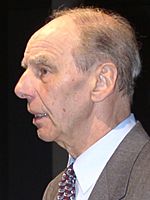Juris Hartmanis facts for kids
Quick facts for kids
Juris Hartmanis
|
|
|---|---|
 |
|
| Born | July 5, 1928 Riga, Latvia
|
| Died | July 29, 2022 (aged 94) |
| Alma mater |
|
| Awards | Turing Award (1993) |
| Scientific career | |
| Fields | Computer science |
| Institutions | |
| Doctoral advisor | Robert P. Dilworth |
| Doctoral students | Allan Borodin (1969), Dexter Kozen (1977), Neil Immerman (1980), Jin-Yi Cai (1986) |
Juris Hartmanis (born July 5, 1928 – died July 29, 2022) was a brilliant computer scientist. He was born in Latvia and later became an American citizen. With his colleague, Richard E. Stearns, he won the 1993 Turing Award. This award is like the Nobel Prize for computer science. They received it for their important work on how difficult computer problems are to solve. This field is called computational complexity theory.
Contents
Life and Career
Juris Hartmanis was born in Latvia on July 5, 1928. His father, Mārtiņš Hartmanis, was a general in the Latvian Army. His sister, Astrid Ivask, became a poet.
Moving to a New Home
In 1940, the Soviet Union took over Latvia. Juris's father was arrested and died in prison. During World War II, in 1944, Juris and his family left Latvia. They were refugees, meaning they had to leave their home to find safety. They were worried about what would happen if the Soviet Union took over Latvia again.
They first moved to Germany. There, Juris Hartmanis earned a degree in physics from the University of Marburg. After that, he moved to the United States.
Education and Early Work
In the U.S., he continued his studies. In 1951, he earned a master's degree in applied mathematics. He got this from the University of Kansas City (now the University of Missouri–Kansas City). In 1955, he earned his Ph.D. (a very high degree) in mathematics. He got this from Caltech.
After finishing his studies, Hartmanis taught mathematics. He taught at Cornell University and Ohio State University.
Developing Computer Science
In 1958, Hartmanis joined the General Electric Research Laboratory. While working there, he helped create many important ideas in computational complexity theory. This field studies how much time and computer memory is needed to solve problems.
In 1965, he became a professor at Cornell University again. He was one of the people who started Cornell's computer science department. It was one of the first computer science departments in the world.
Helping Computer Science Grow
Hartmanis also helped improve computer science and engineering across the country. He led a big study in 1992. This study looked at how to make computer science better for the future. It suggested ways to keep the field strong and improve how students learn about computer science.
From 1996 to 1998, he worked at the National Science Foundation (NSF). This organization helps fund scientific research. He was an assistant director for the computer science part of the NSF.
Recognitions and Awards
Many groups recognized Hartmanis for his important work. In 1989, he was chosen to be a member of the National Academy of Engineering. This means he was seen as a top expert in engineering. He was also a Fellow of the Association for Computing Machinery and the American Mathematical Society. He was also a member of the National Academy of Sciences.
In 2001, he received the Grand Medal from the Latvian Academy of Sciences. This was for his contributions to computer science in his home country.
Major Achievements
In 1993, Juris Hartmanis and Richard E. Stearns won the Turing Award. They won it for a paper they wrote together. In this paper, they introduced the idea of time complexity classes. These classes help us understand how much time a computer needs to solve a problem as the problem gets bigger. They also proved the time hierarchy theorem. This theorem shows that there are some problems that take much longer to solve than others.
Juris Hartmanis passed away on July 29, 2022.
Awards
Juris Hartmanis received many awards for his work:
- Fellow, American Association for the Advancement of Science (AAAS), 1981
- Member, National Academy of Engineering, 1989
- Member (foreign): Latvian Academy of Sciences, 1990
- Member, American Academy of Arts and Sciences, 1992
- ACM Turing Award, 1993
- Humboldt Foundation Research Award, 1993
- Charter Fellow, ACM, 1994
- Honorary Doctor of Humane Letters, 1999
- Computing Research Association (CRA) Distinguished Service Award, 2000
- Grand Medal of the Latvian Academy of Sciences, 2001
- ACM Distinguished Service Award, 2013
- Inaugural Fellow, American Mathematical Society, 2013
- Member, National Academy of Sciences, 2013
See also
 In Spanish: Juris Hartmanis para niños
In Spanish: Juris Hartmanis para niños
 | Misty Copeland |
 | Raven Wilkinson |
 | Debra Austin |
 | Aesha Ash |

